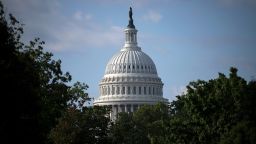A white knuckle midterm election is racing into its last four weeks with the Senate on a knife-edge and with a strong prospect of a Donald Trump-aligned Republican majority in the House.
Democrats are fighting to stave off the first term-curse that usually punishes a president in congressional elections. They are highlighting issues like abortion and the GOP’s extreme turn while on defense over the raging inflation and rising gas prices that are haunting Joe Biden’s administration.
But this is a midterm election like no other it since it’s taking place under the shadow of a former President falsely insisting he won the 2020 election and as Washington still reels from the insurrection he incited to try to stay in power.
Many Republican candidates are running on the false premise that Trump was cheated out of office. Some, in statewide races for governor or secretary of state posts, could end up controlling future elections. And the ex-President himself is using the campaign as a testing ground for a likely 2024 bid to reclaim the White House.
The destiny of the 50-50 Senate could hinge on whether issues like abortion rights and accomplishments in Congress that caused Biden’s popularity to tick up over the summer will preoccupy voters more than the high cost of living and searing Republican attacks over violent crime. But candidates – their strengths, flaws and respective coffers – will also play a role.
Elections for all 435 House seats, which tend to be more nationalized races, are more likely to turn on the prevailing environmental winds, which is why the GOP is still strongly favored to flip that chamber.
How the election will be won and lost:
• History is weighing on Democrats. Presidents almost always take a beating two years after winning election and near 40-year-high inflation and high gas prices are delivering a daily gut punch to millions of voters.
• Besides having history on their side, Republicans have an opening since a majority of voters believe the country is heading in the wrong direction, with fears of a recession growing and the country still trudging through the aftermath of a once-in-100-year pandemic. They are pounding Democrats as soft on crime and fans of open borders as migrants stream across, while leaping on Biden’s low approval ratings at a time of global turmoil to frame the election as referendum on a failing presidency.
• Yet despite post-Labor Day tightening of some of the major races in the GOP’s favor, the fight is still closer than many Democrats dared hope. The tone of the campaign changed in June after the Supreme Court electrified the Democratic base by overturning the right to an abortion. Trump, meanwhile, who scares many voters outside his fervent supporters, roared back into the news with his refusal to hand over classified documents he hoarded at his Florida resort. He also foisted a battery of unskilled election-denying GOP nominees on his party – risking its hopes in key races.
The parties are campaigning on different ground
Often, the two parties seem to be fighting in different elections, given their choice of different issues to run on.
For instance, Pennsylvania Democratic Senate nominee John Fetterman on Sunday beseeched around 1,200 supporters in Bucks County, northeast of Philadelphia, where Democrats must run up their margins, to send him to Washington to restore abortion rights, raise the minimum wage and expand access to the health care he says saved his life.
“Send me to D.C., and I will be the 51st vote,” said the stroke survivor, whose blue collar campaign brands his Trump-endorsed opponent, TV surgeon Mehmet Oz, as an elitist peddler of quack cures and a carpetbagger from New Jersey.
Fetterman represents Democrats’ best chance to flip a Republican-held state and improve on a wafer-thin Senate majority that depends on the deciding vote of Vice President Kamala Harris – or mitigate Democratic losses in key states they’re defending like Georgia and Nevada. Republicans need a net gain of one seat to win control of the chamber.
But elsewhere on Sunday, a rising star of the Republican Party – Virginia Gov. Glenn Youngkin, who won in Virginia in 2021 a year after Biden carried it by 10 percentage points – slammed Democrats for inflicting economic misery.
“Virginians and Americans are seeing inflation go through the roof and cost of living skyrocket and grocery prices and utility bills, and, oh, by the way, cost of university tuitions and everything else they’re seeing,” Youngkin told CNN’s Jake Tapper on “State of the Union.”
“We have got to find a way to reestablish low energy prices, high labor participation.”
Republicans favored in the House, Senate on a knife-edge
Four weeks out, Republicans remain favorites to win the House of Representatives, though their dreams of a huge majority have dimmed as Democrats try to hold onto suburban areas where the Supreme Court’s abortion decision may not be popular.
More on key Senate races
The Senate is on a knife-edge. Races in Georgia, Pennsylvania and Nevada look like they could decide the chamber’s fate. And a new CBS News poll in Wisconsin showed Republican Sen. Ron Johnson – the only GOP incumbent running for reelection in a state Biden carried – in a virtual tie with Democrat Mandela Barnes. Other intriguing battles are also unfolding in Arizona, which Democrats are defending, and North Carolina and Ohio, which the GOP is defending. As Republicans in many of these states have struggled to match the fundraising prowess of Democratic candidates, the powerful GOP super PAC Senate Leadership Fund, which is tied to Minority Leader Mitch McConnell, has tried to level the playing field in some key states.
The consequences of the election are huge. If the GOP does win the House, they will plan to kill Biden’s legislative agenda and to unleash a fearsome set of investigations into the administration, including over the business dealings of the President’s son, Hunter Biden. A GOP majority would be a tool of revenge for Trump and could impeach key Cabinet officials and even the current President himself in a brutal run-up to the 2024 presidential election.
A change in Senate control could have far reaching consequences.
None of the big wins of the Biden administration – health care and climate legislation, a Covid-19 rescue package, a bipartisan infrastructure deal and the first major federal gun safety measures in years – would have been possible if Democrats had not won runoffs in Georgia Senate races in the last election. A Republican-led Senate next year could halt Biden’s judicial nominees and hold the President’s budget plans hostage, while joining with the House to thwart any future movement on his domestic agenda. And in some states, again including Pennsylvania, a woman’s right to an abortion could hinge on whether Democrats or Republicans win governors’ mansions.
How Trump may hurt his own party
For much of the last few months, the midterms have been eclipsed in the news by the war in Ukraine, Trump’s showdown with the Justice Department over the search for classified documents at Mar-a-Lago and devastating hurricanes. Yet the heat of the campaign has noticeably cranked up in recent days as more voters tune in.
The race in Georgia was rocked by a Daily Beast report that Republican Senate nominee Herschel Walker, a retired college football icon, paid for an abortion for a former girlfriend despite campaigning for national prohibitions on the procedure. Walker denied the report, which CNN has not independently confirmed, yet his struggles are emblematic of the troubles of several inexperienced or unvetted candidates that Trump helped win nominations, partly because they signed up to his false claims of election fraud.
In Pennsylvania, Oz failed to take advantage of a summer with Fetterman sidelined because of his stroke. The GOP nominee, who struggled with consolidating conservative support after a nasty primary, may recently have gained some traction in slamming Fetterman on crime. But the Keystone state’s GOP gubernatorial nominee, Doug Mastriano, trails Democratic nominee Josh Shapiro, the current attorney general, in recent polls. Although in a tightly divided state like Pennsylvania, which Biden won by only by a point in 2020, it’s not impossible for an extremist like Mastriano to win.
Another Trump pick, Ohio Senate nominee J.D. Vance has run a lackluster campaign in a state trending red, while Democratic Rep. Tim Ryan has tried to reengage working class voters who have been defecting to Trump. Ohio remains a long shot for Democrats though.
In some states – including Ohio, New Hampshire and Georgia – Trump-endorsed or pro-Trump Senate candidates are running behind their party’s more mainstream gubernatorial candidates in the polls, suggesting that had Trump not played a role in Senate candidate selection, his party would be in better shape.
The unprecedented nature of these midterms is also playing out in the extraordinary spectacle of the former President and most likely 2024 Republican presidential nominee openly lambasting his party’s leader in the Senate, underscoring the forces unleashed by Trump that threaten to again dash his party’s hopes of winning the chamber.
Trump’s influence is on full display in Arizona, which, like Georgia, is a state where Trump tried to overturn Biden’s election win. Trump acolyte Kari Lake, the GOP nominee for governor, has become a rising star of the MAGA world in her campaign for governor and is refusing to say whether Biden is the legitimate president. Recent CNN polling shows no clear leader in the race between her and Democratic nominee Katie Hobbs.
But GOP Sen. nominee Blake Masters could cost Republicans a key pick-up opportunity in his race against Democratic Sen. Mark Kelly, who’s running for a full six-year term after winning a 2020 special election. The former astronaut, who holds a narrow lead among likely voters in CNN’s polling, blasted Masters in a debate last week for peddling “conspiracies and lies that have no place in our democracy.”
Masters, a venture capitalist, flipped a question over whether he believed Biden was the legitimate president to coin a soundbite on a GOP election theme. “Joe Biden is absolutely the President. I mean, my gosh, have you seen the gas prices lately?” he said.
How Biden might drag Democrats down
That answer by Masters underscores Democrats’ vulnerability – and perhaps the most potent Republican attack.
While the Supreme Court’s abortion ruling and the chaos in the GOP gave Democrats plenty of material to paint Republicans as a threat, the pain of high fuel costs hits every time voters pass gas station signs. Higher prices for eggs and meat hurt the families that can least afford it. Some of this is beyond Biden’s control and can be traced to post-pandemic issues and the war in Ukraine. Yet if the election ends up turning on the economy, the President’s party is probably in trouble – even if Biden has presided over bright spots, like a low unemployment rate. Economic sentiment often ends up deciding presidential elections. And Biden, despite some more favorable polling in recent weeks, still stands at 39% approval in the CNN Poll of Polls.
In new CNN polls last week in Arizona and Nevada, more than twice as many voters cited the economy and inflation as their top issue as cited the second place issue in each state – abortion (44% economy vs. 14% abortion in Nevada, 41% economy to 17% abortion in Arizona). Majorities in each state said that the economy there is worsening.
Yet at the same time, the Trump-endorsed Senate candidate in both states, Masters in Arizona and Adam Laxalt in Nevada, were viewed less favorably than their Democratic opponents.
The findings appear to confirm what Republican Senate leaders made clear long ago – the their best chance in November lies in a relentless focus on the Biden economy and the ex-President not making the campaign all about him.
So while history and economic factors favor the Republicans, the midterms could still be a cliffhanger.







